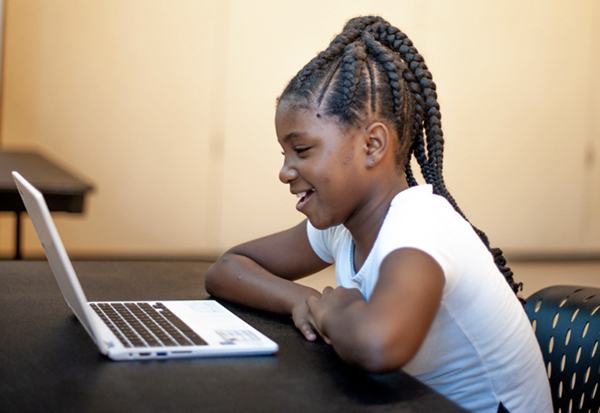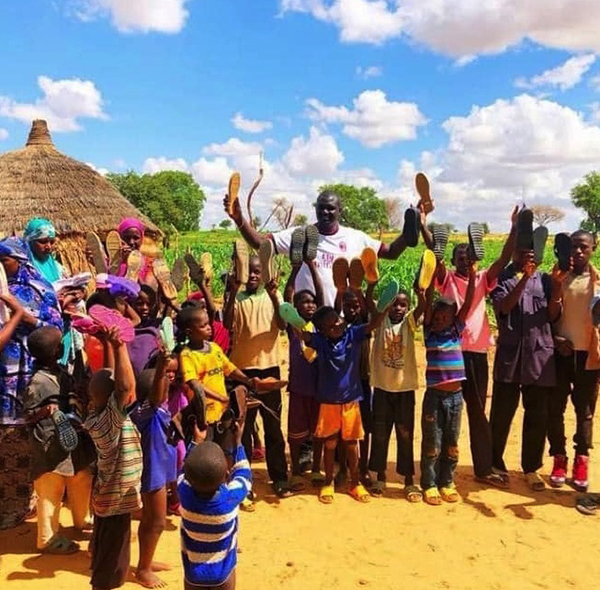MAKING A DIFFERENCE
By Darlene Donloe
Contributing Writer
For more than 20 years, Reading Partners has been helping students to succeed in reading and in life by engaging community volunteers to provide one-on-one tutoring.
Unfortunately, once the COVID-19 Delta variant started spreading throughout communities, the expectations for a 2021-22 school year became uncertain.
The widespread school interruptions exacerbated pre-existing opportunity gaps (with pandemic-related learning loss disproportionately impacting Black and Latino students and students experiencing economic disadvantages).
Reading Partners believes reading is foundational and that the ability to read transforms lives and empowers children and communities to thrive.
When students can read on grade level by fourth grade, Reading Partners believes they become well-positioned to graduate from high school, access higher education and contribute to an increasingly information-based world.
Reading Partners is committed to ensuring that all students receive equitable access to the literacy education they deserve and rigorous research has proven that Reading Partners helps students significantly increase reading proficiency.
Reading Partners wasn’t about to let COVID-19 interfere with its mission, so it pivoted the program to include a new phase called Reading Partners Connects, which allows volunteer tutors to work remotely with individual students in real-time.
Given the many variables at play, Reading Partners decided that a hybrid approach to tutoring would ensure that students would be able to receive much-needed literacy support regardless of public health circumstances.
Reading Partners in the L.A. area decided to continue supporting students through online tutoring while returning to an in-person program model where possible.
Reading Partners Connects offers the same research-based curriculum materials, scripted lessons and coaching that support volunteers through the traditional tutoring model.
Annelise Chin is the senior external relations manager for Reading Partners. Chin began working at Reading Partners because she wanted to give back to her community. She has high praises for the company she has worked for since 2016.
“Reading Partners is a literacy intervention nonprofit,” Chin said. “We’re a nationwide organization working to envision a world where no student is left behind. Our goal is to give them the tools they need to succeed. Access to literacy intervention will help them unlock the opportunity literacy can bring them. We believe in education equity.”
If they were going to continue helping students during the pandemic, Chin said the choice to go virtual was clear.
“Due to strict protocols, our schools are not allowing volunteers on campus right now,” Chin said. “They want to keep cases low. So we had to decide quickly how to continue helping our students.”
She said, in the beginning, they “weren’t quite sure what would happen” when they moved the program online.
“We had done it one way for so long, we didn’t know what to expect,” Chin said. “We generally test students three times a year to see how much they have improved. We were amazed by the results. We produced the same results as when we were in person. We were able to replicate the experience tutors and students were having — but online.”
Facing historic educational disruptions, 90% of K-2 Reading Partners students and 81% of all Reading Partners students met or exceeded their primary literacy growth goal.
During the 2021-22 school year, Reading Partners plans to provide direct literacy tutoring and support to 567 students in the Los Angeles area across its various learning environments.
Currently, 75 students are being tutored online. Chin said the goal is to hit the 567 student mark across its 13 partner schools.
Reading Partners works with students from kindergarten to grade four.
“They can come back multi years,” Chin said. “Our goal is to get them up to grade level by the end of the school year so they don’t have to come back. But if they need to, they are welcome.”
Chin, 28, said when the schools closed during the pandemic, it was an “education crisis.”
“There are students who need additional resources,” she said. “Early on we recognized the fact that students were going to have to turn to learning online. You have students who rely on the physical services at school. We worked hard to pivot our program really fast to support the students.”
Students who participate in Reading Partners are from Title 1 schools, 50% male, 50% female, 70% Hispanic, 13% mixed race or other, 11% Black, 5% white, and 1% Asian. Some are reading between six months to 2 ½ years behind their grade level.
The Impact & Innovation reports for the 2020-21 school year include the following highlights.
In the Los Angeles area, 425 students at 13 partner schools and other community-based locations were matched with 514 community volunteers who delivered a total of 12,897 tutoring sessions over the course of the year.
One hundred percent of tutoring sessions were delivered online via Reading Partners Connects.
Despite the heavy shift to an online tutoring platform, and because volunteers received a collective 3,714 hours of training last year (including many new focus areas), 99% of volunteers were satisfied with their experience.
Chin describes volunteers as a “diverse mix” of retirees, high schoolers and college students. She said Reading Partners has a strong partnership with colleges. She added the organization has “great corporate partners who allow workers to take time off and get credit.”
“Our program requires so little time,” she said. “Anyone can sign up. You just have to have an hour of available time between 9 and 5, Monday through Friday. You gotta have some flexibility.”
Chin, who studied communications at UCLA, said Reading Partners is “a safety net for students who might be falling behind.”
“We are an intermediate piece where we can come in and help the student and get them back to where they need to be,” she said. “We are mobilizing community members.”
Chin said the program is entirely operated by volunteers.
“We have staff run the centers,” she said. “We have between 40-75 volunteers per school site. They actually do the tutoring and implement the program with the students. We train the volunteers and then pair them with a student.”
Pre-COVID, Reading Partners would be set up in a classroom on a school campus. There would be about seven sets of students and volunteers working in classrooms at one time.
Although schools are currently open, Reading Partners is currently working with students online via Zoom.
To attract more volunteers, Chin said she emphasizes how easy it is for them to support their individual communities.
“Right now they can sit in their chair, log on and they are right there with a student,” said Chin, who grew up in Albany, California, on the east shore of San Francisco Bay. “It’s so meaningful. Volunteers become a part of a student’s learning journey. These kids light up with their volunteers. It’s so easy to give that time. The reward is incredible. You get to help and make a difference.”
Chin describes Reading Partners as “a really amazing place.”
“We know we can be a support to schools no matter what,” she said. “It’s about individual support. We are poised to expand and support more students and work with more schools. We need more support from the community.”
“Making a Difference” is a weekly feature profiling organizations that are serving their communities. To propose a “Making a Difference” profile, send an email to newsroom@wavepublication.com.
Darlene Donloe is a freelance reporter for Wave Newspapers who covers South Los Angeles. She can be reached at ddonloe@gmail.com.












